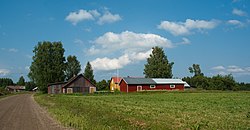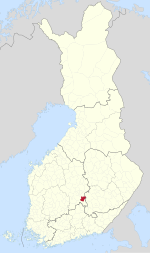This article needs additional citations for verification. (October 2021) |
Leivonmäki is a former municipality of Finland in the Central Finland region. The municipality was consolidated with Joutsa in 2008. The population of Leivonmäki was 1,135 in 2007.[1]
Leivonmäki | |
|---|---|
Former municipality | |
| Leivonmäen kunta Leivonmäki kommun | |
 Farms in Leivonmäki | |
 Location of Leivonmäki in Finland | |
| Coordinates: 61°54′55″N 026°07′25″E / 61.91528°N 26.12361°E | |
| Country | Finland |
| Province | Western Finland Province |
| Region | Central Finland |
| Established | 1868 |
| Merged into Joutsa | 2008[1] |
| Seat | Leivonmäen kirkonkylä |
| Area | |
| • Land | 380.8 km2 (147.0 sq mi) |
| Population (2007-12-31) | |
| • Total | 1,135[1] |
It is located 40 kilometres (25 mi) south-east from Jyväskylä. It is known for its marshy grounds and its national park.
The municipality was unilingually Finnish.
Geography
editBogs and other wetlands make up roughly 18,100 hectares (45,000 acres) or 48% of the former municipality's area, the average in Central Finland being 25%. The largest wetlands are Kivisuo, Haapasuo, Havusuo, Rokasuo and Höystösensuo.[2] Leivonmäki has fewer lakes than the Central Finnish average as it is located on a drainage divide area within the Kymijoki basin. The largest lake is Rutajärvi, which discharges into the Päijänne.[3]
Villages
editThe following villages have or have had their own school district:[4]
A part of the municipality also belonged to the Vallaspelto school district, the village of Vallaspelto itself being part of Joutsa.[4] Kurkijärvi also had its own short-lived school between 1933–1937.[5]
Naming and etymology
editThe name of Leivonmäki was first attested in 1564 as Leijuomäki. Mäki is Finnish for "hill" and the parish church is located by a hill called Kuhasenmäki, which therefore may have originally been called Leivonmäki or Leivomäki. According to Väinö Voionmaa, Leivonmäki may also have been named after the Leivonen farm in the village of Anajala in Sääksmäki.[6]
The initial element is most likely the word leivo "skylark", though linguist Terho Itkonen also considered the possibility of the dialectal variant Levonmäki being the original form of the name. According to this explanation, the initial element would be lepo (genitive: levon) meaning "rest", referring to a resting place for cattle. However, the name is written with an i in most documents from the Swedish era, and the name was in use before the area was settled permanently – before cattle could have been kept in the area. The form Levonmäki may also be due to the Savonian pronunciation of leivo as "leevo".[6]
Twinnings
editLeivonmäki was twinned with the Estonian Haaslava Parish.[citation needed]
References
edit- ^ a b c "Väestörakenne ja väestönmuutokset kunnittain 2007" [Population Structure and Vital Statistics by Municipality] (PDF). doria.fi (in Finnish). Statistics Finland (Tilastokeskus). 2008. p. 216. Retrieved 25 August 2024.
- ^ Vilkuna 1981, p. 18.
- ^ Vilkuna 1981, p. 19.
- ^ a b Vilkuna 1981, p. 467.
- ^ Vilkuna 1981, p. 464.
- ^ a b Sirkka Paikkala (SP) (2007). "Leivonmäki - Suomalainen paikannimikirja" (PDF). kaino.kotus.fi (in Finnish). Institute for the Languages of Finland (Kotus). p. 229. Retrieved 25 August 2024.
- Literature
- Vilkuna, Janne (1981). Leivonmäen kirja (in Finnish). Leivonmäki: Municipality of Leivonmäki (Leivonmäen kunta). ISBN 951-99356-3-0.
External links
editMedia related to Leivonmäki at Wikimedia Commons
- Municipality of Joutsa – Official website
